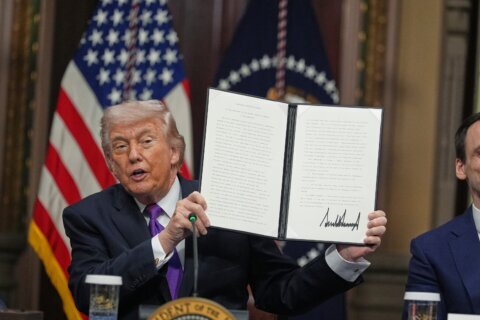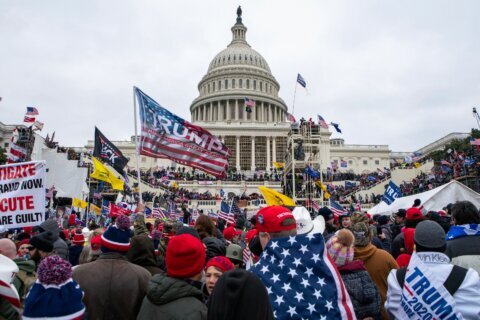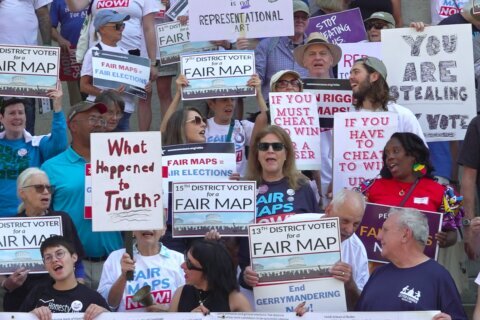Wearing masks and sitting far apart from each other, Virginia state lawmakers met in Richmond on Wednesday during the coronavirus pandemic for an extraordinary session that will be written about in history books.
The state Capitol was empty, with the House of Delegates meeting outside the building under a tent and senators gathering a couple miles from there at the Science Museum of Virginia.
Sen. George Barker, who said he is high-risk for coronavirus because he’s recovering from open-heart surgery and pneumonia, sat in a Plexiglass box.
- Sign up for news alerts from WTOP
- No evidence to suggest contact lens wearers more at risk for COVID-19
- Metro to step up platform rebuilding amid coronavirus pandemic
- Fairfax Co. animal shelter sees ‘astounding’ uptick in pet adoptions
- Latest coronavirus test results in DC, Maryland and Virginia
- Coronavirus resources: Get and give help in DC, Maryland and Virginia
House members had to contend with technical glitches and noise from nearby protesters on a hot day.
At one point, House Speaker Eileen Filler-Corn became dizzy and fainted. She was uninjured and back on her feet about 20 minutes after it happened.
The goal of the legislative session was to consider Gov. Ralph Northam’s amendments to various bills and the state budget that lawmakers passed just last month on March 12.
Since then, the coronavirus pandemic has upended their spending plans.
Lawmakers agreed to freeze more than $2 billion in new spending, delaying raises for teachers and collective bargaining powers for public employees.
Both chambers agreed to push back the start date for increasing the state’s minimum wage from $7.25 per hour to $9.50. That was supposed to take effect in January 2021, but now it will take effect four months after that in May.
Republicans argued that the increase should not happen at all because businesses are currently struggling.
“Instead of being sympathetic to these businesses in their worst time, we’re tightening the screws,” said Republican Sen. Bill DeSteph.
Democrats had a different take.
“The American economy is 70% driven by consumer spending,” said Democratic Sen. Scott Surovell. “The people who are likely to spend are not the people that are buying new cars or the people with lots of money or business owners — it’s people that are at the bottom of the economy.”
Lawmakers approved a Northam amendment that delays a ban on betting machines in restaurants, convenience stores and gas stations. Northam said he wants to keep those machines in place and use the money generated from them to help fight the pandemic.
The Senate killed Northam’s plan to move local elections to November.
Those elections, which include mayoral and local council elections, are scheduled for May 5, but could still be delayed.
Northam could use his executive authority to push the elections back a couple of weeks or call lawmakers into a special session to consider delaying the elections.








